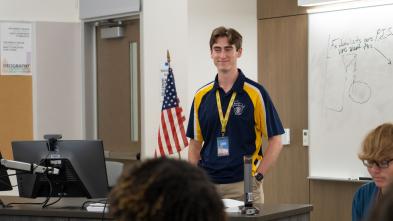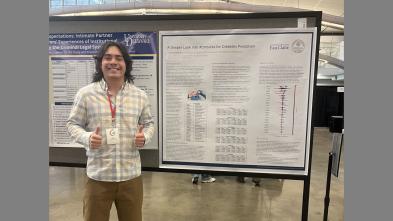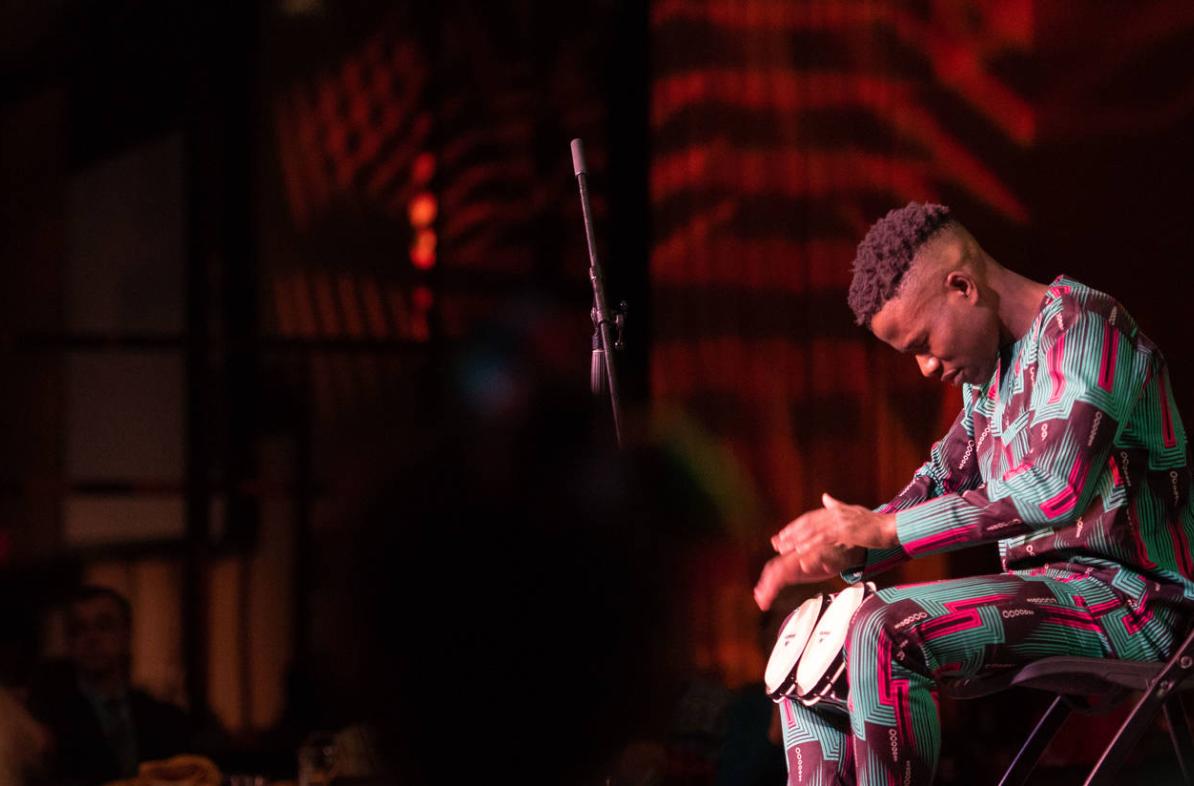
New grad creates documentary telling stories of African students at UW-Eau Claire
This fall, a documentary that shares the experiences of three African students living in the Chippewa Valley while studying at the University of Wisconsin-Eau Claire will premiere during a special screening at an Eau Claire theater.
Olu Famule, a May graduate, created a documentary that follows three African students during a semester at UW-Eau Claire. Famule is donating any proceeds to the UW-Eau Claire Foundation to support scholarships for students of color. (Photo by Shane Opatz)
Kehinde Olu Famule, who graduated from UW-Eau Claire in May, filmed “Ndani Eau-Claire” while he was still a student. He has spent the months since his graduation editing the documentary, which he describes as a “story that needs to be told.”
The film will premiere at 2:30 p.m. Nov. 6 at the Micon Budget Cinema in downtown Eau Claire. Tickets will be available on the Micon Cinema website beginning Oct. 23.
“As a Nigerian American, I see opportunities to tell stories that show the nuances, beauty and complexity of Black stories every day,” says Famule, who graduated from UW-Eau Claire with a major in biology and minor in art. “I saw that a story about our small African community in Eau Claire had never been told before.”
‘Ndani Eau-Claire’
“Ndani Eau-Claire” — which means “Inside Eau-Claire” in Swahili — centers around three Blugolds, shining a light on the lives of a small group of African college students who live in the Chippewa Valley.
“Through the documentary, we follow these three students through the ups and downs of their semester,” Famule says. “The story includes themes of activism, Black experience, the impact of COVID-19, personal growth, police brutality and community.”
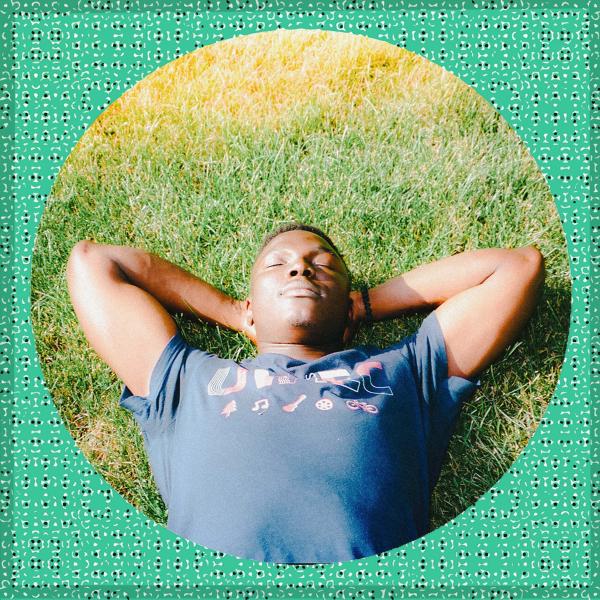
Paul Agbashi is a biology and pre-professional medicine major with a pre-professional health science minor who moved to the United States a year ago from Nigeria. (Submitted photo)
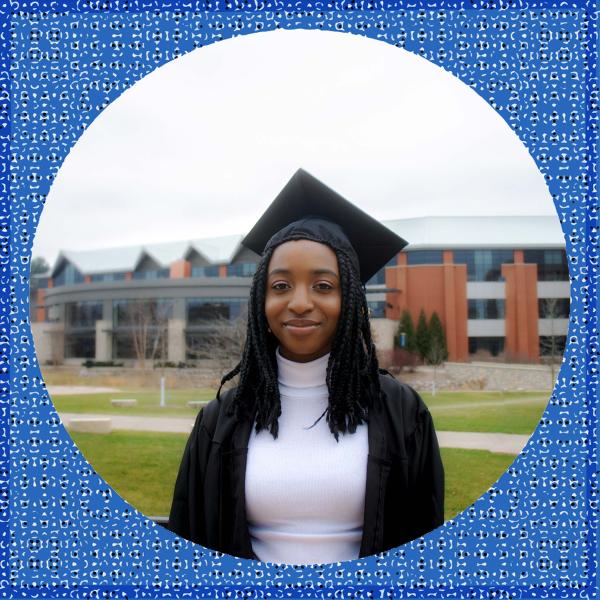
Iman Dikko is an international student from Nigeria who graduated in May with a management, operational and supply chain comprehensive major. (Submitted photo)

Christabel Araba (Bella) Sackey is a Ghanian American who has a major in public health and a minor in psychology. (Submitted photo)
The Blugolds featured include Paul Agbashi, a biology and pre-professional medicine major with a pre-professional health science minor who moved to the U.S. a year ago from Nigeria; Iman Dikko, an international student from Nigeria who graduated in May with a management, operational and supply chain comprehensive major; and Christabel Araba (Bella) Sackey, a Ghanian American from Middleton who has a major in public health and a minor in psychology.
“We follow these students through the chaos of 2020, as they face challenges of being Black in a predominantly white institution and also the impact of the coronavirus,” Famule says. “Later, our focus shifts to the EndDSARS movement, the youth-led social unrest created to fight police brutality, and the oppressive systems occurring back in Nigeria. The Nigerian diaspora all over the world helplessly watched the government’s violent response, and subsequently, experienced mental and emotional turmoil for their family and relatives back home. Our protagonists and their Eau Claire community are similarly impacted by this social unrest happening 6,000-plus miles away.”
Through the documentary, viewers will see the students grow, find their voices and work to create a brighter future, Famule says.
In addition to the three featured students, the documentary also includes UW-Eau Claire students, faculty and staff who are involved with the African Student Association, which is made up of students who are interested in celebrating and educating about African cultures.
Famule did the filming for his documentary from October-December 2020. Since January, he has been editing the film, with much of the editing work being done during his final semester of college. It was challenging to juggle the project along with college and life responsibilities, but worth the effort, he says.
Raising awareness, making change
Famule hopes the project will make people more aware of the experiences of African people living in their community.
“My goal is that it will promote cultural understanding and give a glimpse into the lives of communities of color in Eau Claire, to ultimately create a more empathetic and socially conscious Eau Claire,” Famule says. “As a visual artist, I want my art to bring change to the world. I believe art can be a tool for social justice and film to be a medium that transcends societal barriers.
“Overall, I want people to leave with a feeling that the world is a big place, and there are matters globally and locally that need attention.”
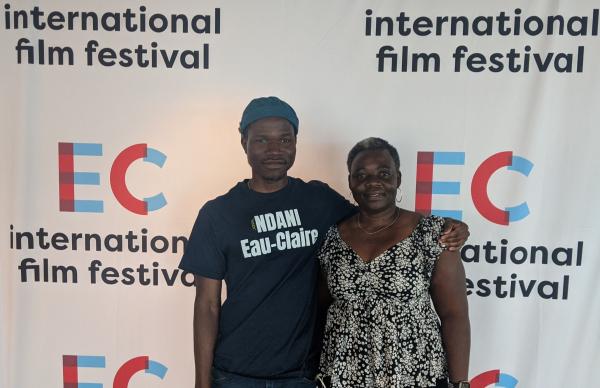
Olu Famule, who as a Blugold discovered his passion for telling stories through film, attends an Eau Claire film festival with his mother. (Submitted photo)
Famule had been thinking about creating “Ndani Eau-Claire” for years, but never had the time or funding to pursue it. He saw his opportunity after a friend forwarded him information about the “We Are the Chippewa Valley," a funding program created to support artists during the pandemic.
He quickly put together a proposal for “Ndani Eau-Claire,” and was happily surprised to learn several weeks later that his project would be funded by the grant.
With the help of local photographers, visual artists and photographers, he’s been working to bring his vision for the project to life ever since.
Giving back to UW-Eau Claire
Famule says he will donate any monies he earns from the documentary to the UW-Eau Claire Foundation to support student scholarships through the Office of Multicultural Affairs.
“My decision to use the profits raised from ‘Ndani Eau-Claire’ to support OMA scholarships is one based on love, gratitude and appreciation,” Famule says. “Organizations such as OMA and Blugold Beginnings were the places that nurtured and supported me. Without the support of OMA, I wouldn’t be the person I am today.
“They created spaces that connected me to amazing people and supported me academically, financially and mentally. Using my passion for the visual arts and filmmaking to raise funding to further support the efforts of OMA is the least I can do.”
It’s inspiring to see a Blugold who was an incredible leader during his years as a student on campus now working to create opportunities for other students who are studying at his alma mater, says Dang Yang, director of OMA.
“I am really proud of Olu’s commitment to giving back, and I’m excited about his documentary project, as well,” Yang says. “As a student, Olu was a leader, a mentor and a change-maker. Now, as an alumnus, Olu continues to lead by example. It means so much to us that Olu will be giving back to support other students of color on campus.”
Famule, who was born in Nigeria but moved to Superior when he was 10, came to UW-Eau Claire thinking it was a first step toward medical school and a career in health care.
However, he eventually realized that wasn’t the path he wanted to follow. He changed his major to biology with a minor in art and reframed how he saw his future. He credits the campus community with helping him find a path forward that feels right for him.
“I was only able to make this decision because of the love and support I found here in Eau Claire,” Famule says. “I went into UW-Eau Claire planning to pursue medicine, but as I grew more in touch with myself, I realized that I have always wanted to tell stories through art.”
Changing majors, he says, helped prepare him to create his documentary and begin planning a future centered around the arts. Through his art minor, he was able to explore photography and other aspects of the visual arts, which he says helped to open his mind to a new realm of creative career goals.
“UW-Eau Claire is the place where I found myself, formed lifelong connections and learned to leave my comfort zone,” Famule says. “Coming to UW-Eau Claire was the decision that propelled me on the journey of becoming the person I want to be. Just having the space to grow and connect with so many amazing people brought me comfort.”
Eau Claire also is a place where people genuinely appreciate creativity and art, so there are countless opportunities to display, celebrate and promote local art and artists, Famule says, noting that he hopes more young people are supported as they pursue careers in the arts.
“Similar to how law, medicine and engineering have the power to shape and develop society, art is also a powerful tool for procuring change, whether for social justice, building communities or capturing the human experience,” Famule says. “Artists are individuals who challenge and move society forward. Yes, we need more doctors and lawyers in the world, but we also need more painters, more filmmakers, more poets and fashion designers.”
Embracing opportunities
As a student at UW-Eau Claire, Famule embraced the many opportunities he found to learn about science and art, but also about the world around him. He also found experiences that helped him grow as a leader and a teacher.
When Famule came to UW-Eau Claire, he didn’t know many people, but quickly made connections with diverse students through Blugold Beginnings, a program that supports historically excluded students in a variety of ways.
The people he met and the experiences he found through Blugold Beginnings inspired him to seek out even more opportunities in other offices and organizations across campus. He also became a counselor for the program’s summer STEM camps, teaching and mentoring area youth.
After participating in UW-Eau Claire’s Civil Rights Pilgrimage, he became a program coordinator, leading other students as they immersed themselves in a trip that took them to sites throughout the South that are important to the civil rights movement.
And through OMA and the African Student Association, Famule found avenues to share his drumming, a Nigerian custom he learned as a young boy that keeps him connected to his culture. He performed at events on campus and in the community, helping build cultural literacy through his drumming.
“I seek experiences that broaden my perspective so I can be more culturally literate and help others be more culturally literate,” Famule says. “It’s a never-ending journey. I want to help facilitate an environment where people feel understood.”
Looking ahead to a bright future
As he finalizes details for his documentary’s Eau Claire premiere, Famule also is working to ensure that “Ndani Eau-Claire” will be available online. He also hopes there soon will be more screenings in affiliation with Midwestern film festivals.
In addition to the documentary, Famule is working on a photo project called “Betta Life,” which is a series of pictures from African students in Eau Claire coupled with advice they would give their younger selves.
For more information
A trailer for the “Ndani Eau-Claire” documentary can be found here.
You can reach Olu Famule at olufamule@gmail.com or 715-919-1491.
You may also like
